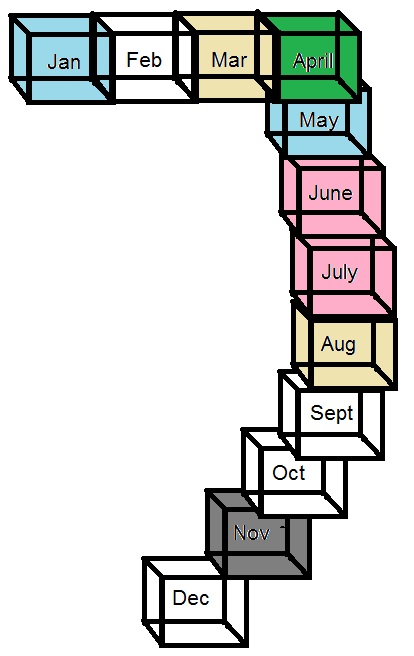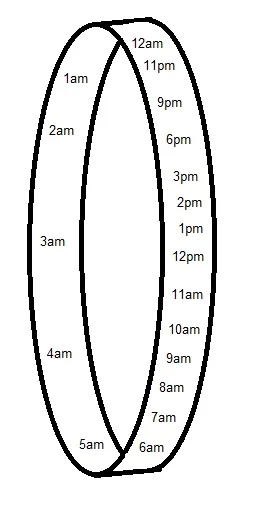A while back, I was trying to explain something to Tom related to the months of the year. He clearly wasn't understanding what I was trying to describe, even though it seemed so clear to me. After a few more experiences like this, he jokingly said to me one day: "I think you have synesthesia."
Never having heard the word before, I think I brushed him off ("No, YOU have synesthesia!) and continued my attempt to explain to him what I was seeing that he couldn't visualize.
Fast forward to a bit later when I remembered that weird word he had called me, and I decided to google it. Turns out it wasn't just another word for stubborn or strange. It was actually a word for a neurological phenomenon (some people call it a non-malignant neurological disorder) where stimulating one of the senses can lead to automatic, involuntary experiences in a second sense.
In English, it means that areas of your brain that control senses may overlap and cause you to experience more than one sense when you experience something. Usually the connections between these areas of your brain are severed as an infant, but for synesthetes, the connections remain.
This can mean a number of things, and there are a lot of different types of synesthesia, but some of the most common that I've found are:
Grapheme-color: The most common form of synesthesia, it's when letters or numbers have a color associated with them. For some people, A's are always red, and 7's are always yellow.
Chromesthesia: Where certain sounds can trigger colors. Someone may see colors while listening to music.
Spatial sequence: Where numerical sequences, months or dates are seen as points in space.
Number form: A number form is a mental map of numbers that automatically and involuntarily appear whenever someone who experiences number forms thinks of numbers. Different from a number line.
Ordinal linguistic personification: Ordered sequences, such as numbers, days, months and letters are associated with personalities. Normally co-occurs with other forms of synesthesia.
One thing that's true for all of them, though, is that they're always involuntary, consistent and automatic.
And it turns out that I have spatial-sequence, number form, and ordinal linguistic personification synesthesia! No, I do not have any of the fun ones - no colors or sounds for me! Still, most people's first reaction when I tell them this is that I'm crazy. However, I think it's crazy that not everyone sees things this way!
I'll try to explain a bit what I see.
Let's start with months. For as long as I can remember, the months of the year have always been in a 3D "7" type shape around me, and depending on where we are in the year, my position in this 7 will change. For example, today is October 15th. If I think back to our wedding day, I immediately without thinking will look above me, since September is above October. Tom will tell you that he can watch my eyes move when this happens. Now if you start talking about our plans to go see a Broadway show in January, I'll look up and towards the right.
Or, I might physically "jump" to January's location. And from there, if I think about my birthday, it will seem way to the right and lower. I tried to draw out the shape, but what's hard to see is how 3D the image actually is. September through December feel way "lower" to me than the rest of the months. It's almost like they fall off a cliff after August. And to get from December 31st to January 1st, I have to jump way up. Depending on the time of year, I can feel the difference of where I am.
Yes, I realize this sounds crazy to you, but for me, I see it clear as day. I've been told that if you test a group of people and ask them to name all the months backwards, skipping every other month (so December, October, August..), people with synesthesia can do it much quicker because they can just count over them in their picture, without having to think of the order.
The way I think of hours in the day is similar, but it follows an almost backwards clock instead of a 7. Depending on what time it is, I'm in that location on the circle. So for the first half of the day I feel like I'm climbing up towards noon, and after lunch I'm heading more down for the rest of the hours. Hours when I'm asleep are much more spread out, and on the back half of the loop. I've tried to draw them out below. This is as close as I can get:
I briefly mentioned a cliff when I was talking about my months, but it happens with numbers too. (I drew my years below, but if you're talking about normal numbers, or years relating to how old someone is, the diagram is completely different). What I mean by cliffs is, if I'm thinking about the year 1985, when I was born, I can't "see" the year 1999 from there. It's over the hill so to speak from the 80s. This is why I tend to jump around in space when I'm thinking of different numbers. Years/numbers that I use or think about more often are also more clearly defined in space. Anything after 2015 (since I have experienced it yet) is kind of off ahead and too the right. Back in 2007 I would have said 2015 was out there too, but it moved a bit now that I've experienced it. This is the only time I've ever experienced numbers moving. (And is possibly why there is such a cliff between 1999 and 2000. Some people thought the world was going to end at the turn of the millennium, so maybe I couldn't visualize anything past that?)
I could spend hours describing this to you, but I've found that the longer I talk, the more people's eyes glaze over, and the more they think I'm crazy haha. (I didn't even get into the personification stuff!) So I'm going to shift gears a bit and share some interesting facts that I've found. There have been quite a few studies done, and as a result there are some shared characteristics that seem common among people who have some form of synesthesia:
- They often have a tendency to confuse left and right and/or have a poor sense of direction. (This is definitely me. Unless I stop to think about it, I probably only get left/right correct about 20% of the time.)
- May be more prone to migraines than the general public. (I definitely get migraines, although I'm not sure if this is cause and effect or coincidence)
- May be prone to hypersensitivity to light, sound, smell and touch. (I'm not sure if this has to do with my migraines or synesthesia or both, but this is usually true when I'm in the middle of a migraine.)
- Are usually very creative, often talented at music, art or poetry. (I'll give this one partial credit?)
- More prone to deja-vu, prophetic dreams and other paranormal experiences. (I'm afraid if I admit to this you're going to really start to think I'm crazy!)
- Depending on the type of Synesthesia someone has, they may either be poor at mathematics (generally people with grapheme-color, Chromesthesia, or Ordinal linguistic personification) or excel at it (generally people with spatial-sequence or number form).
- Have a better than average memory. Some studies conclude that synesthetes may be able to recall 2-3 times the number of memories than someone who doesn't have it. (It's hard to compare my memory to another person's, but I think this is true. The easiest test seems to be to test my memory against my best friend's. We both share about 25 years of memories and I can usually recall way more than she can).
It's one of those things that you can't change, and is always there, so it doesn't really matter if you know if you have it or not. However, it has been fun for me to be able to read about it and realize why I do certain things, or use it to explain to others more easily what I "see." I personally love that I have synesthesia, and think that it's benefited me in multiple ways in my life. I think it will be fun to see if any future children that Tom and I have also have it (since it can be genetic, especially among females).
Think you may have synesthesia? Here are some signs you might:
Do you...?
- Think of the letter R and see the color green?
- Think of the number 4 and sense a personality?
- See a certain object and hear a sound in response?
- See the months of the year and feel it in 3-D?
If any of those seem true, you might have a form of synesthesia!
What do you think, am I crazy? Do you think you have synesthesia? Do you read this and think "Wait, not everyone does that!?"



